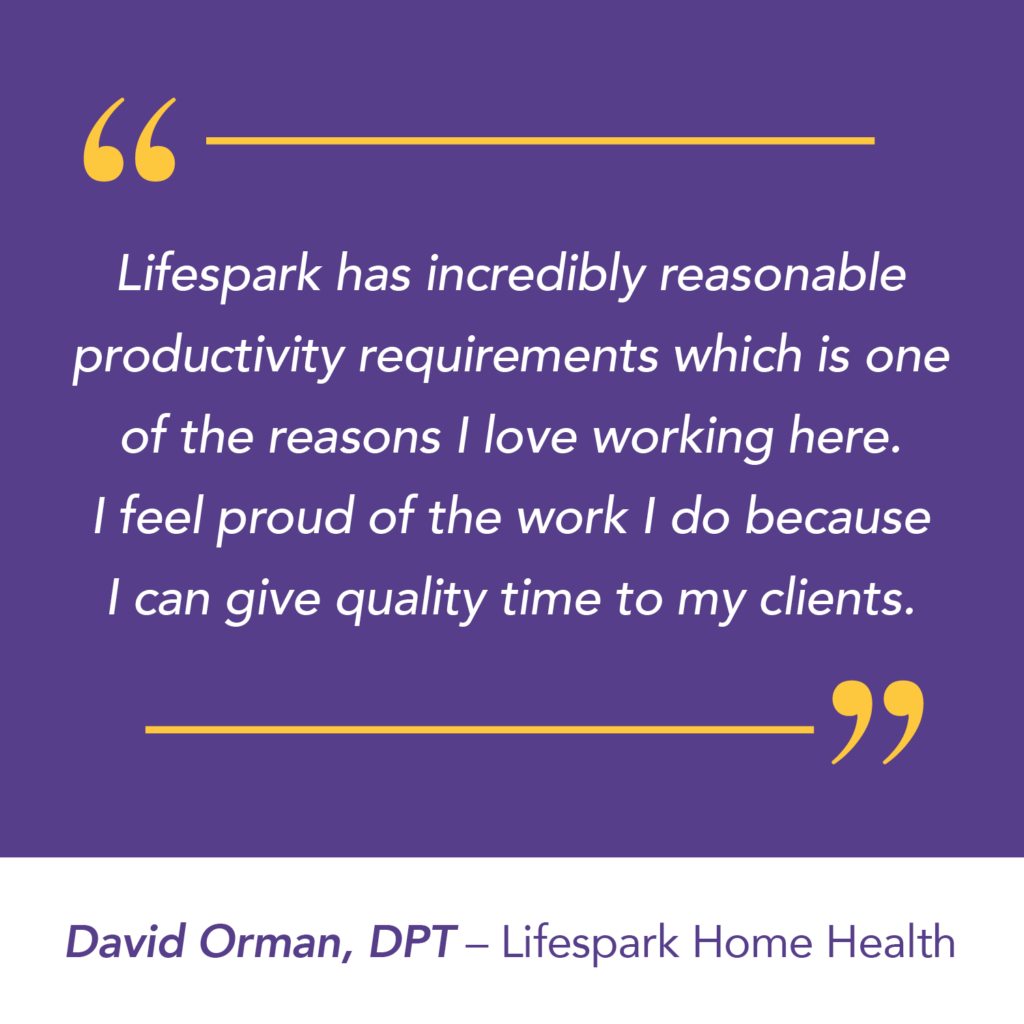
Even before completing his doctorate in physical therapy, David Orman, DPT, knew he wanted to work in home health. “In outpatient settings, you tend to get bogged down treating one body part, like you’re the shoulder guy, or you’re the spine guy, whereas in home health, you see such a variety of clients and conditions. The work never becomes a monotonous routine,” he said. “I may not be the absolute best in the world at shoulder rehab, but I love being a generalist and keeping a broad array of skills sharp.”
Owning his schedule
Another aspect of home health that appealed to David was having more independence and flexibility. “I’m not a morning person and neither are most of my clients, so my first appointment is usually at 9:30 a.m., which I really enjoy,” he said. That same flexibility applies to team members with younger children who prefer early morning visits, allowing them to be home when their kids get out of school.
“We’re expected to see a certain number of clients each week, but when I meet with them is almost entirely up to me and my clients,” he said. “That allows me to plan ahead and be more efficient with my time.” Having control over his schedule also gives him the ability to set up personal appointments without missing any work. “If I have a dental appointment one morning, I can see more clients on the following day.”
With a relatively small territory, David spends very little time on the road. Still, he appreciates having those 10 or 15 minutes to clear his head before his next appointment. “When you work in a clinic, you just don’t get a break between clients,” he said.
David said he tries to finish charting before his next visit to avoid leaving out important details. “I can often chart while a client is resting or working on an exercise, or I’ll ask if I can stay for five minutes at the end of their visit,” he said. “It’s pretty rare that I need to do documentation at home.”
From evaluation to discharge
In addition to his own caseload, David evaluates new clients who’ve been referred to Lifespark for skilled home health. If a client is extremely medically complex, he’ll continue seeing them, but for less complex clients, one of his physical therapy assistants (PTA) will usually handle follow-up visits.
David schedules a supervisory visit with the PTA and the client every six sessions. “I can read the case notes, but being there in person really helps me understand the client’s progress and it gives us a chance to go over their plan of care,” he said.
As a licensed physical therapist, David is also responsible for performing 30-day reassessments to track progress and perform outcome measures. In addition, he oversees discharge visits which can include making recommendations for additional therapy which includes outpatient therapy right in their home, and planning for future support. “The range of clients and types of visits I do keeps the work interesting and challenging,” he said.
Pride in his work
Before joining Lifespark, David worked for a large home health company with intense productivity demands. “I was driving hours every day from Edina to Stillwater to the northern suburbs, and seeing so many clients that I could only spend the minimum amount of time with them,” he said. “I was working longer days, providing worse care, and having no pride in my work. It was the worst possible approach to health care.”
David learned about Lifespark from a former coworker who’d left their mutual employer and was now working for Lifespark Skilled Home Health. “He told me, ‘This place is awesome—you should definitely consider applying,’” he said. “I did and he was right. Lifespark is better in every possible way.”
One of the differences is having a manageable caseload. “Lifespark has incredibly reasonable productively requirements which is one of the reasons I love working here,” he said. “I feel proud of the work I do because I can give quality time to my clients.”
Positive, supportive culture
Lifespark’s culture is another reason David believes in the company. “The culture here is wonderful—really positive and enthusiastic,” he said. “Team members are happy and relaxed because they feel genuinely supported and not overworked.”
Another important aspect of the culture is a willingness to help other team members. “If I’m asked to pick up a couple extra visits to cover for a coworker on leave, I’m happy to do that. They’ve done the same for me dozens of times,” he said. “I never feel guilty about taking time off, whether I’m out sick or on vacation. I wish all my PT friends could experience what it’s like to work at Lifespark.”
If you’re interested in growing your career at Lifespark, check out our physical therapy job opportunities.


